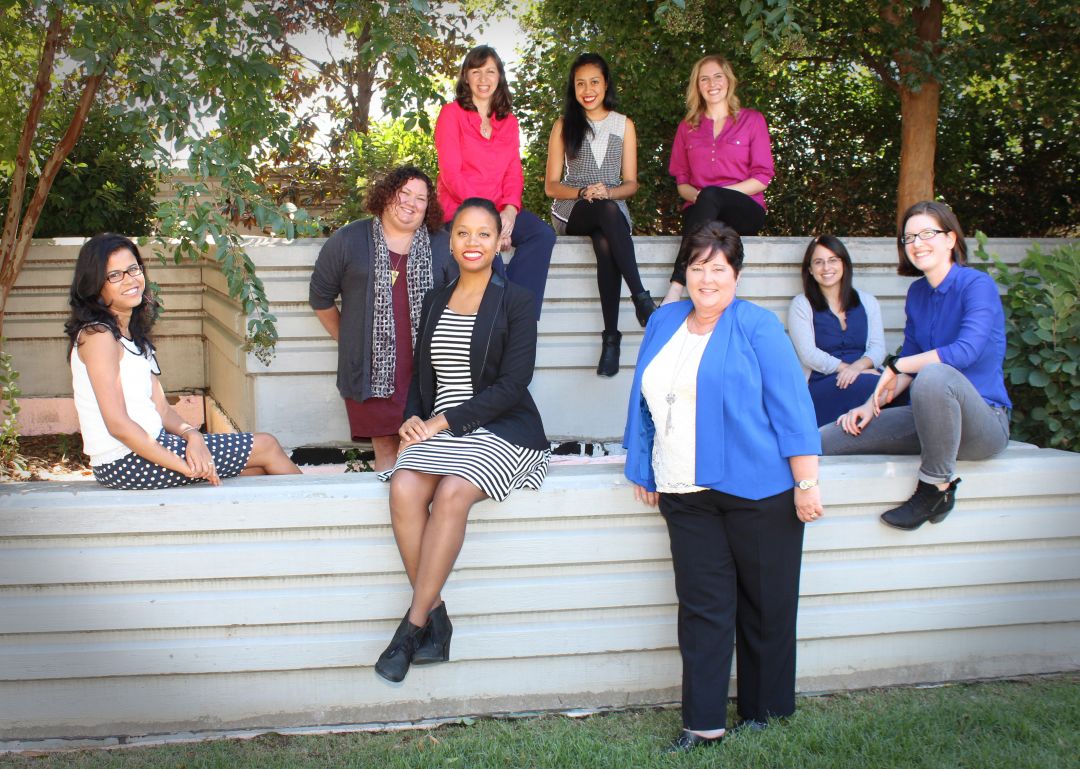
Bringing Computing Engagement to a New Level
2015-2016 Foley Scholars and Finalists and Inaugural GVU Distinguished Master's Student
Across the wide range of inspired research taking place in the GVU Center, the Foley Scholars and Finalists and GVU Distinguished Master's Student represent the best of our community of human-centric computing researchers. They embody GVU's commitment to finding solutions with broad impact to existing and emerging human pursuits through the use of computing technology.
Our graduate students' findings and innovations have the power to change the world, whether it's through exploring the technology habits of people, engineering new computing methods or building original interfaces. Their work creates innovative paths for advancements in technology. We have seen this for more than two decades through the passionate and forward-thinking people in GVU.
The current group of graduate researchers selected as the the 2015-2016 Foley Finalists is no exception, and from this distinguished group of eight, we are pleased to announce this year's Foley Scholar recipients.
 The 2015-2016 Foley Scholars are Barbara Ericson, Tanushree Mitra and Jessica Pater.
The 2015-2016 Foley Scholars are Barbara Ericson, Tanushree Mitra and Jessica Pater.
Read about this year's entire class of graduate student superstars to find out where their work is taking them and for a peek at the ambitions they have in shaping the future of computing. Their work has already garnered them a unique distinction within GVU - they are the first all-woman group of Foley Finalists, and the recipient of the first GVU Distinguished Master's Student Award is also a woman.
Jim Foley, professor of Interactive Computing, GVU founder, and for whom the Foley Endowment is named, established a standard of excellence in technical innovation, which continues to this day through his influence in the Master of Science in Human-Computer Interaction program and through his academic and research involvement throughout Georgia Tech's computing enterprise. For more information, visit the James D. Foley GVU Center Endowment page.
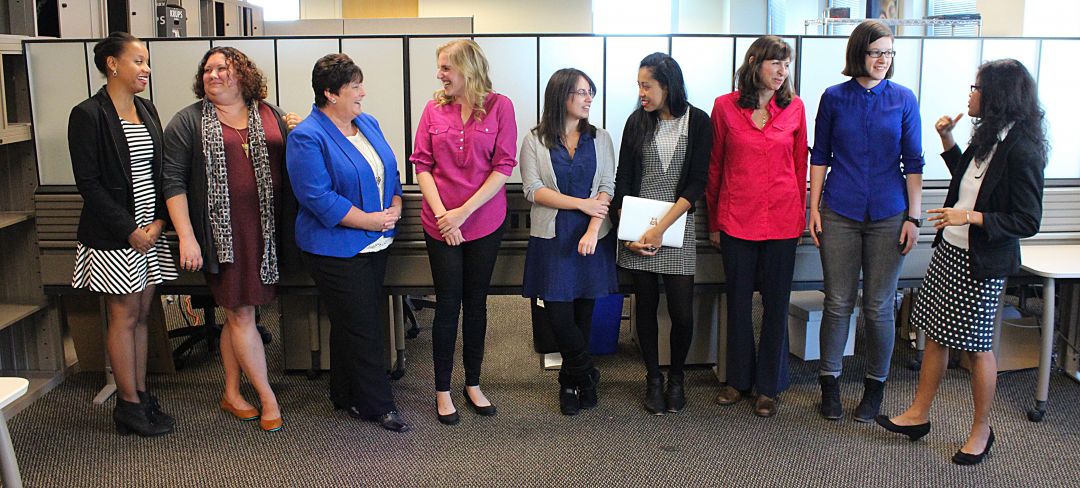
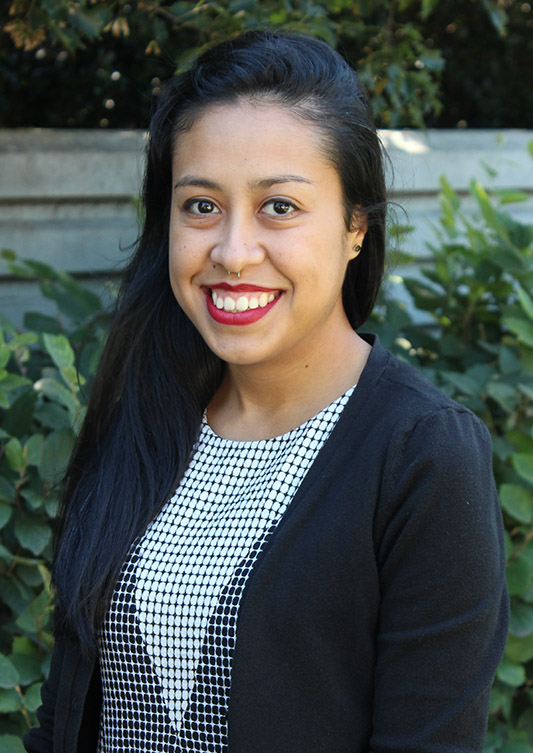 Finalist Mariam Asad
Finalist Mariam Asad
Supporting Digital Advocacy in Civic Groups
“I firmly believe that HCI research should be done in service of a community. It is the articulation of community needs and concerns that define our problem spaces, shape our methodologies, and which should be implicated by our designs.”
In the HCI community, Mariam Asad wants to increase the focus on civic engagement and direct action. Most of the research in the realm of digital democracy explores more institutional approaches, such as online polling platforms or tools to facilitate online deliberation, she says. Her research focuses on more critical uses of tools to supplant perceived gaps in democratic institutions. While her initial research looked at ad hoc uses of social computing to support ‘on the ground' protest work, Asad plans to build on three years of ethnographic work and collaborate to build stronger HCI design with and for communities.
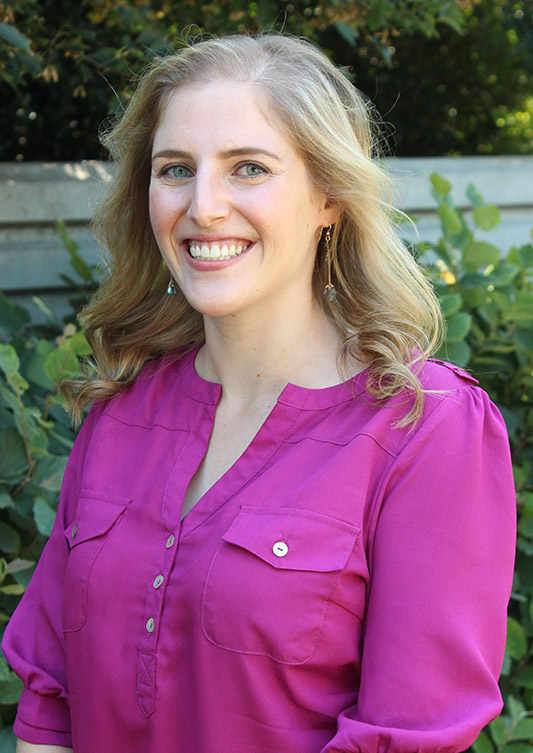 Finalist Laura Barg-Walkow
Finalist Laura Barg-Walkow
Retooling Medical Interventions
“My motivation to work on these projects is because of their clear potential to affect change in patient and healthcare provider practices. I strongly believe in the engineering psychology goals of improving safety, performance, and satisfaction in the healthcare domain.”
Laura Barg-Walkow has repeatedly demonstrated her commitment to bridging the gap between research and practice in healthcare. From pain management to exergames, she's tackles a gambit of patient needs. Her time spent in medical settings has allowed her to make recommendations to practitioners who can implement her findings to provide near-term benefits to patients. One recent project in a hospital's emergency room focused on how external interruptions affected task performance. She developed a model of this so that best practices might be developed to mitigate negative consequences of interruptions in the ER.

 Finalist Maia Jacobs
Finalist Maia Jacobs
Personalizing Patient Care
“I have worked for three years with breast cancer patients in Georgia, learning about their experiences. Their continuous optimism, selflessness, and commitment towards helping future patients has been very inspirational.”
Maia Jacobs is developing and examining the real world benefits of personalized health tools for cancer patients. The design of this technology reflects information about individual patients and provides customized support and resources to users. Cancer diagnosis is overwhelming for many and Jacobs says the medical system can feel impersonal and overburdened, making it difficult for patients to receive necessary support. She is working to create a different experience for patients, and has worked with more than 70 breast cancer patients to see how mobile technology can support their cancer journeys. Jacobs says the personal accounts from participants shows how personalized health management directly impacts their lives during and beyond treatment.
 Foley Scholar 2015 Barbara Ericson
Foley Scholar 2015 Barbara Ericson
Rethinking Ebooks for Teaching Computer Science
“Ebooks have great potential for improving learning and we are just starting to explore that potential. Making all content in an ebook adaptive so that it's customized to users could greatly increase the diversity of students studying computing.”
Barbara Ericson sees the possibilities of ebooks to transform how people learn computer science. She says ebook content could be selected to build on prior knowledge and interest. Women, for example, who are interested in careers helping people might get ebooks with examples of how computing does just that. Applying this to African American teen males playing digital games could allow them to learn computer science through ebooks tailored by such games. Including stories of successful women and minorities in computing may provide much needed role models and change the stereotype of who can succeed in computing and attract more diversity in the field, according to Ericson.

 Finalist Lauren Margulieux
Finalist Lauren Margulieux
Advancing Education Pedagogy in Online Learning
“As a young researcher, I feel like it's difficult to have a broad enough grasp of what we know and what we don't know in a field to make impactful contributions. With the education taxonomy I developed though, it really felt like an area in which I could make big strides towards progress.”
Lauren Margulieux aims to help enable university students to learn more independently, especially in online learning. A growing movement exists to make educational content freely available online, and Margulieux says even professors like the idea of putting content online so that they can focus on developing students' skills such as problem solving. In her research, Margulieux found reports that suggest that many students, especially those who are already underrepresented in colleges, don't learn well in online environments. Her work considers how to change this and help others who have yet to identify the learning strategies that can best advance their education.
 Foley Scholar 2015 Tanushree Mitra
Foley Scholar 2015 Tanushree Mitra
Understanding Social Media Credibility
“There is a need to better understand social media credibility and its implications in our everyday life. I have the unique opportunity to blend both computational techniques and human-centered qualitative methods to advance this research agenda.”
Tanushree Mitra is passionate about understanding how online social networks affect real world user behavior and how to steer that influence to benefit society as a whole. She envisions taking this understanding out of the lab by designing tools that can empower users and their online experiences at a larger scale. To situate this with her current research agenda, she imagines building tools that can help social media users to make informed decisions. Mitra says the interdisciplinary nature of her work and teaming with talented collaborators has encouraged her to take on challenging projects that can have major impact in the field of social computing.

 Finalist Briana Morrison
Finalist Briana Morrison
Designing Methods to Improve Computer Science Education
“We know a great deal about the best ways to teach math and biology and physics because we've been researching it for decades. We don't know much about the best ways to teach computing to students.”
Briana Morrison studies educational psychology as it relates to computer science - specifically introductory programming - in order to advance the imperative for more computer science education in the U.S. school system. By measuring components of cognitive load in the computing discipline, she has found that students trying to keep too many things in “working memory” to understand a concept don't learn the concept as well. In a study with fellow Foley finalist Lauren Margulieux, she introduced subgoal labels into learning a text-based programming language, replicating earlier results showing that this improves learning of computing concepts. But the results differed in some ways from other disciplines, informing her future research to explore these differences in detail.
 Foley Scholar 2015 Jessica Pater
Foley Scholar 2015 Jessica Pater
Understanding Online Behavior to Help Treat Mental Illnesses in Youth
“Individuals who suffer from eating disorders support their disease through activities both online and offline. With this understanding, I hope to better inform diagnostic and treatment activities to address all risky behaviors and activities that could undermine treatment.”
Jessica Pater has been able to learn about aspects of young peoples' lives that few others, even parents, can claim. During a four year study in a local school district, she worked closely with school personnel and middle school students to observe their technology uses in a natural setting. The insights gained through this research have shaped the direction of her work and afforded Pater an understanding of how to design research projects and programs with youth and public school systems. She is focused on using this knowledge to help individuals suffering from mental illnesses, who often suffer alone because of little or no physical manifestations of the illnesses.
2015-2016 Foley Scholars and Finalists and Inaugural GVU Distinguished Master's Student


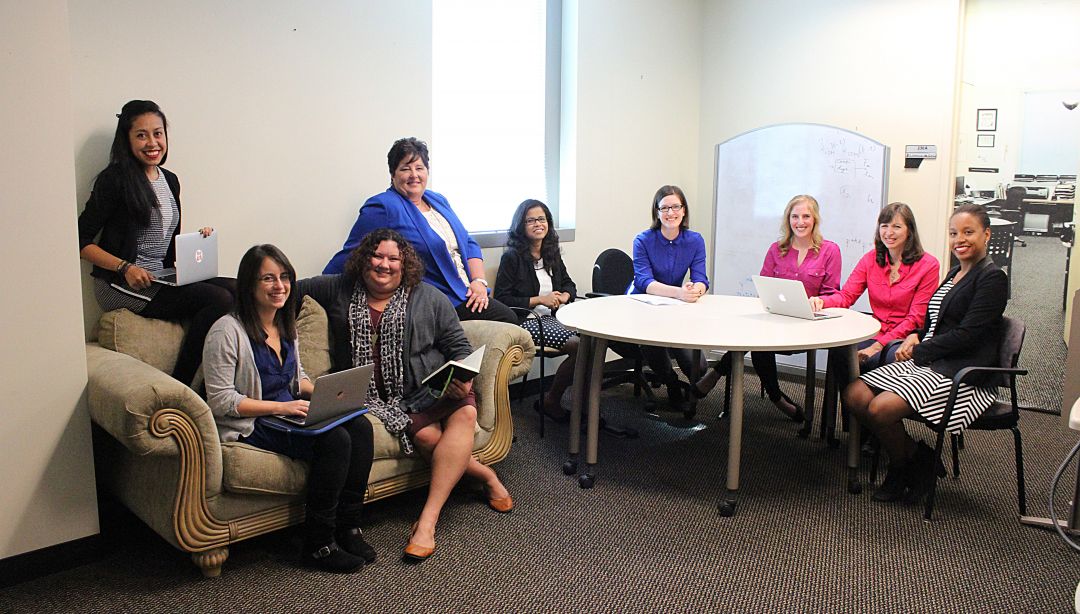
Writer/Photographer: Joshua Preston


